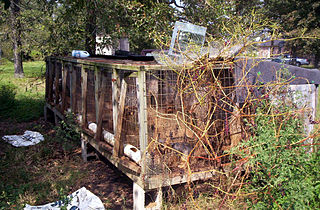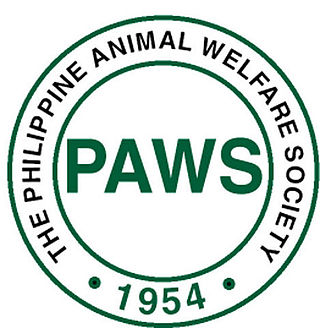
Pet adoption is the process of transferring responsibility for a pet that was previously owned by another party. Common sources for adoptable pets are animal shelters, rescue groups, or other pet owners. Some organizations give adopters ownership of the pet, while others use a guardianship model wherein the organization retains some control over the animal's future use or care.

An animal shelter or pound is a place where stray, lost, abandoned or surrendered animals – mostly dogs and cats – are housed. The word "pound" has its origins in the animal pounds of agricultural communities, where stray livestock would be penned or impounded until they were claimed by their owners.

A puppy mill, also known as a puppy farm, is a commercial dog breeding facility characterized by quick breeding and poor conditions. Although no standardized legal definition for "puppy mill" exists, a definition was established in Avenson v. Zegart in 1984 as "a dog breeding operation in which the health of the mill’s dogs is disregarded to maintain a low overhead and maximize profits". They are cited as being a result of increased demand for household pets, especially after World War II. The Veterinary Medical Association of the Humane Society of the United States defines the main characteristics of a puppy mill as "emphasis on quantity over quality, indiscriminate breeding, continuous confinement, lack of human contact and environmental enrichment, poor husbandry, and minimal to no veterinary care."

A humane society is a group that aims to stop cruelty to animals. In many countries, the term is used mostly for societies for the prevention of cruelty to animals (SPCA). In the United Kingdom, and historically in the United States, such societies provide waterway rescue, prevention and recovery services, or may give awards for saving human life.

The Royal Society for the Prevention of Cruelty to Animals (RSPCA) is a charity operating in England and Wales which promotes animal welfare.
Trap–neuter–return (TNR), also known as trap–neuter–release, is a controversial method that attempts to manage populations of feral cats. The process involves live-trapping the cats, having them neutered, ear-tipped for identification, and, if possible, vaccinated, then releasing them back into the outdoors. If the location is deemed unsafe or otherwise inappropriate, the cats may be relocated to other appropriate areas. Ideally, friendly adults and kittens young enough to be easily socialized are retained and placed for adoption. Feral cats cannot be socialized, shun most human interaction and do not fare well in confinement, so they are not retained. Cats suffering from severe medical problems such as terminal, contagious, or untreatable illnesses or injuries are often euthanized.

World Animal Protection, formerly The World Society for the Protection of Animals (WSPA) is an international non-profit animal welfare organization that has been in operation since 1981. The charity's mission is to create a better world for animals by protecting them.
A no-kill shelter is an animal shelter that does not kill healthy or treatable animals based on time limits or capacity, reserving euthanasia for terminally ill animals, animals suffering poor quality of life, or those considered dangerous to public safety. A no-kill shelter uses many strategies to promote shelter animals; to expanding its resources using volunteers, housing and medical protocols; and to work actively to lower the number of homeless animals entering the shelter system. Up to ten percent of animals could be killed in a no-kill shelter and still be considered a no-kill shelter.
RSPCA Australia is an Australian peak organisation established in 1981 to promote animal welfare. Each state and territory of Australia has an RSPCA organisation that predates and is affiliated with RSPCA Australia.

The Philippine Animal Welfare Society (PAWS) is a volunteer-based, non-government organization whose goal is to prevent animal cruelty through education, animal sheltering and advocacy, based in Quezon City, Philippines. It was founded in 1954 by Muriel Jay. PAWS believes that the creation of a more peaceful society starts with the widening of mankind's circle of compassion which includes animals, thereby envisions a nation that respects animals, practices responsible pet ownership and protects wildlife. The volunteer-based organization rehabilitates these animals in the hope of finding them new homes and a second chance at a good life. PAWS does not take in pets of other people, but only victims of cruelty or neglect where the animal offenders are charged with violation of the Animal Welfare Act in court.

The Massachusetts Society for the Prevention of Cruelty to Animals-Angell Animal Medical Center (MSPCA-Angell) is a 501(c)(3) non-profit organization with its main headquarters on South Huntington Avenue in the Jamaica Plain neighborhood of Boston, Massachusetts. It was founded in 1868, and is the second-oldest humane society in the United States. "MSPCA-Angell" was adopted as the society's identity in 2003, and indicates the names of its two closely related predecessor organizations: Massachusetts Society for the Prevention of Cruelty to Animals and Angell Animal Medical Center. The organization provides direct care to thousands of homeless, injured, and abused animals each year, and provides animal adoption, a veterinary hospital, advocacy, and humane law enforcement.
The National Animal Interest Alliance (NAIA) is a non-profit organization in the United States dedicated to promoting animal welfare and animal husbandry practices, strengthening the human-animal bond, and safeguarding the rights of responsible animal owners and professionals through research, public education and public policy. The NAIA mission is "to promote the welfare of animals."
Hugh John Wirth was an Australian veterinarian and animal welfare advocate in Victoria, Australia. In March 2011 he celebrated 30 years as the resident vet on 774 ABC Melbourne.
RSPCA NSW is a not-for-profit charity operating in New South Wales, Australia that promotes animal welfare.
Korea Animal Rights Advocates (KARA) is a non-profit organization that supports animal welfare in Korea and deals with animal cruelty cases. It is also responsible for the care of abandoned animals and their adoption.

Pauleen Charmayne Bennett is an Australian scientist researching anthrozoology at La Trobe University in Victoria, Australia.
RSPCA Tasmania is an animal welfare, education and advocacy charitable organisation based in Tasmania, Australia. They run and maintain a shelter facility for the boarding of surrendered and seized animals, as well as operating retail shop fronts for the adoption of pets. They are responsible for the enforcement of state and federal animal welfare laws for domestic animals, and laws relating to non-commercial animal related activities in Tasmania.

This article is about the treatment of and laws concerning non-human animals in Australia. Australia has moderate animal protections by international standards.

Give Our Strays A Chance (GOSAC) is an organisation founded in 2013 by a Western Australian 10-year-old boy Dean Morris, for the purpose of raising awareness of animal rescue and raising donations for animal shelters and pounds.










